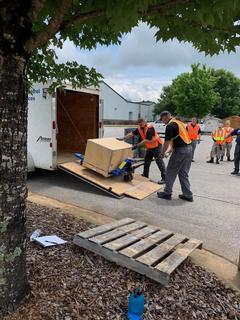Staff Sections
Main Content
Group 6 Conducts Points of Distribution Training
Lt Col Bohler trains NC Wing members on PODs in Statesville
6/10/2019–STATESVILLE, NC–The 2019 hurricane season is upon us. Members of Group 6 of Civil Air Patrol (CAP) recently trained in Statesville to partner with emergency management agencies to serve and support their communities following a destructive natural disaster.
After a disaster strikes, CAP works with local and state agencies to establish Points of Distribution (PODs) to disburse essential and critical items - like food, water, ice and tarps to residents until their access to basic needs can be restored. Across all of North Carolina, CAP volunteers train to serve in these POD teams to provide assistance in times of disaster.
In 2010, the North Carolina Wing began an important partnership with the North Carolina Division of Emergency Management (NCEM) as a primary POD responder to county emergency management requests for POD support in the event of a disaster. Early on, this partnership was put to the test during Hurricane Irene in 2011, the Orange County NC Water Shortage, Hurricane Matthew in 2016 and most recently during Hurricane Florence in 2018.
Lt Col Pete Bohler, Disaster Relief Officer for the NC Wing, offered training for 20 Cadets and Senior Members in Statesville on 8 June 2019. The morning began with members reviewing material from the Federal Emergency Management Agency (FEMA) IS-26 POD training program and learning how all four types of PODs are set up, manned and operated.
The program is standardized across the Wing with POD kits supplied by the NCEM to ensure their training can be utilized across the state. It was made clear to all participants that it is essential to have a large pool of trained POD team members to provide the personnel necessary for communities during disasters that eliminate local services. To date the NC Wing has 126 POD qualified individuals with more expected as more training opportunities become available.
To illustrate the importance of this training, Lt Col Bohler, shared stories of his experiences while serving after several hurricanes swept coastal North Carolina. “PODs are a vital source of support and comfort to families who have lost everything to return some since of normalcy to their lives,” said Lt Col Bohler.
During the afternoon, participants had the opportunity to simulate a POD mission by actually setting up a POD site in a parking lot using the supplies from the provided POD kit. Trainees could actually see how a POD works to have victims and vehicles driving through to pick up supplies when there is a lack of infrastructure to support the normal distribution of food, water or other supplies.
What was the big takeaway from this POD training? It was made very clear to all participants that CAP volunteers, both senior members and cadets, are an invaluable resource for not just their communities, but for all of North Carolina.
When asked why POD training is so important, Lt Col Bohler said, “The value of this training is to ensure that you know what you’re doing so you can make a difference in someone’s life at a time when they need us the most.”
“After last year’s Hurricane Florence, the NC Wing of CAP provided a huge manpower response for a number of POD sites in the Wilmington area. This operation was a fantastic example of how Civil Air Patrol supports its friends and neighbors following a disaster, and just a small part of what we do after the storm passes,” said Group 6 Commander Lt Col Jeff Focke.
Sub Content
- My Account
- Member Login
- Register for an account
Search
- Recent Articles
- Cunningham Field Composite Squadron Hosts Air Operations Training and Familiarization
- NC Wing CyberPatriot Preliminary State Award Winners Announced
- Tar River Composite Squadron Cadets Compete in CyberPatriot Competition
- Civil Air Patrol Remembers Veterans for Christmas
